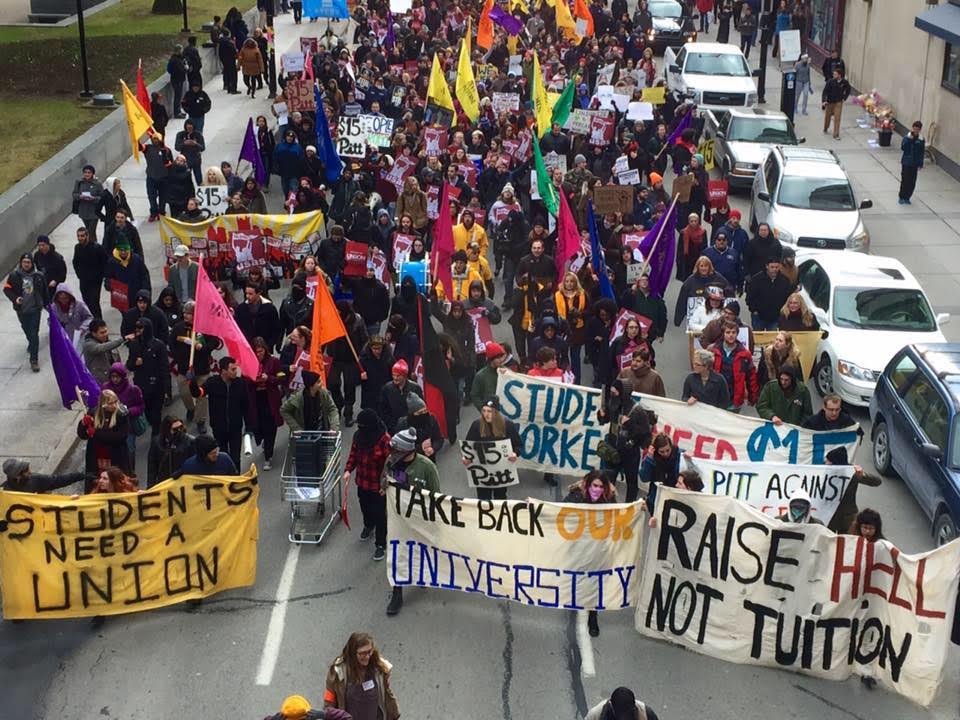
United Students Against Sweatshops (USAS) is the country’s largest student labor solidarity organization, with more than 150 university locals campaigning for union rights alongside campus workers, community members and garment workers producing college apparel overseas.
Students chanted, “Whose university? Our university!” as they stormed their president’s office on a sunny spring day.
For more than a year and half, students of USAS Local 150 had organized alongside adjunct faculty fighting for a union at Fordham University in the Bronx, N.Y. What should have been a peaceful march to the president’s office ended with a violent assault on student activists by campus security. All the while, the president, vice president and dean waited behind closed doors as the chanting and tension only escalated outside. Soon after, the news of the incident spread nationally, as USAS members and alumni called more than a hundred times, demanding justice for the student activists and the freedom for adjuncts to unionize. The following week, the university president conceded, giving adjunct faculty the recognition for a union.
These victories are hard fought for. Students face serious consequences for organizing, often threatened with punitive sanctions, the removal of scholarships and more. The university is a labor market—both domestic and international, and when collectively organized, students hold the most power over the institution and the boss, being the university president. Because the university has a stake in tuition-paying students, students can take significant risks in solidarity with workers. Knowing this, USAS members have mobilized to secure major wins for workers on their campuses, in their communities and even overseas in the factories that produce collegiate apparel.
Just this year, a multitude of USAS locals organized alongside their campus workers to achieve a fair contract across many sectors: dining service workers with UNITE HERE, graduate students and adjunct faculty with UAW, AFT, SEIU and more. Harvard USAS Local 5 led a mass walkout and joined the strike of dining service workers to achieve a historic contract at the richest university on the planet. Students at Northeastern University this last week spent day and night canvassing in support of an impressive strike vote to achieve the same contract with UNITE HERE Local 26. In the words of Heidy Beirrero, a food service worker at Northeastern: “Without the students, there is no fight.”
USAS takes on the global race to the bottom by institutionalizing a core strategy against exploitation in the garment industry. In the early years of USAS, waves of student sit-ins led to the formation of university labor codes of conduct, which would then apply to the working conditions of garment workers producing collegiate apparel. When abuses are identified in factories producing for Nike, Adidas and others, USAS organizes in solidarity with garment workers to transform sweatshops into dignified union jobs in countries around the world, including Indonesia, Bangladesh, Honduras and more. Just this summer, we celebrate a victory against the world’s largest sportswear brand—Nike. Nike had decided to close its factory doors to independent inspectors, and USAS launched an international campaign in response. Because of student pressure, including sit-ins, protests and rallies—more than five major universities severed licensing contracts—costing the brand millions. We led two nationwide speaking tours with garment union leaders and coordinated more than 25 global protests against Nike, spanning five continents. Student and worker pressure resulted in a landmark factory access agreement between Nike and the Worker Rights Consortium (WRC), granting unequivocal access to Nike supplier factories around the world. USAS showed Nike that sweatshop labor is not so cheap after all.
For more than 20 years, students have led the charge alongside the workers engaged in university supply chains. But now we are taking on that same fight for ourselves—student workers.
The largest employers in 15 states across the United States are actually universities. In states like California, Iowa, New York and others, a solution to economic inequality is sitting in our classrooms. Students are no longer accepting the university strategy of pitting student and full-time workers against each other in a system where all are overworked and underpaid. Across major university systems, student workers are leading the charge for a $15 minimum wage from the boss—the university president. We have taken the fight from the classroom and into the streets. Across private and public institutions, we are winning. From New York University, to Columbia and University of Washington-Seattle, student workers organized for a living wage for ALL campus employees, including themselves. The economic impact at UW-Seattle alone raised the wages of more than 9,500 university employees. Imagine the scale of impact across state university institutions, which employ thousands on a single campus, county or even state. USAS members are forming non-majority unions across new turf—their classrooms. Collectively, USAS is demanding an end to the economic crisis of the working poor on our campuses and communities.
What does our work mean for the future of the labor movement? For two decades, USAS has served as the the strongest student to union pipeline. In solidarity with our union brothers and sisters, USAS has equipped students with union organizing skills and strategy to take on the boss—and win. Our membership reflects what is the most multiracial and multi-ethnic generation in college yet, with a majority of our membership reflecting working-class communities of black, brown, immigrant, and LGBTQ backgrounds.
One out of four USAS members go on to work for labor unions and social justice organizations post graduation. More than ever, our labor movement is in need of innovative, passionate and young leaders. USAS is bringing student power to the bargaining table, and we aren’t slowing down.

